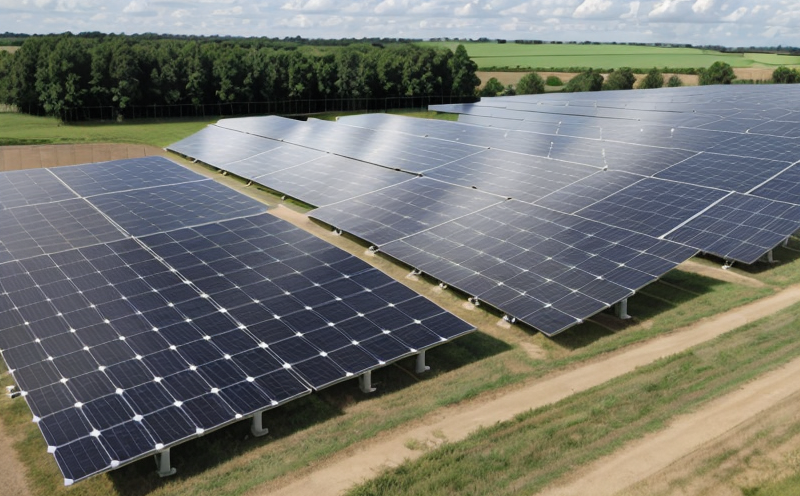ISO 26262 Functional Safety Testing in Renewable Applications
The ISO 26262 standard is specifically designed to ensure that automotive systems are developed with adequate functional safety. However, its principles and methodologies can also be applied to renewable energy systems. In this context, ISO 26262 Functional Safety Testing ensures the safe operation of complex electrical and electronic components within renewable energy applications such as solar photovoltaic (PV) systems, wind turbines, and energy storage solutions.
Renewable energy systems are increasingly critical to global sustainability efforts. These systems rely on sophisticated electronics that must function reliably under various environmental conditions. As these systems become more complex, the potential for latent defects increases, which can lead to safety issues or performance failures if not addressed properly.
The ISO 26262 framework provides a structured approach to identify and mitigate risks associated with electrical and electronic components in automotive applications. This standard is comprised of various parts that address different aspects of the development lifecycle, from concept through production, operation, and decommissioning.
In the context of renewable energy systems, functional safety testing under ISO 26262 involves:
- Identification of potential risks associated with electrical components
- Detailed analysis to determine system boundaries and interfaces
- Development and implementation of mitigation strategies for identified risks
- Testing procedures to validate that the system meets specified safety requirements
The testing process is comprehensive, covering hardware-in-the-loop (HIL) simulations, software-in-the-loop (SIL) simulations, and real-world integration tests. These tests are designed to ensure that each component of the system operates safely under all expected conditions.
For example, in a solar PV array, functional safety testing ensures that the inverters and other electronic components can handle overcurrents or voltage spikes without causing damage to the system or posing hazards to personnel. Similarly, in wind turbines, functional safety tests verify that control systems respond correctly to gusty winds or sudden changes in power demand.
The testing process is not limited to hardware alone; it also encompasses software and firmware components. This holistic approach ensures that all aspects of the renewable energy system are thoroughly evaluated for safety compliance.
By adhering to ISO 26262, organizations can demonstrate their commitment to quality and reliability in complex systems. This standard provides a robust framework for identifying and addressing potential risks before they become operational issues or safety hazards.
Benefits
The implementation of ISO 26262 Functional Safety Testing in renewable energy applications offers numerous benefits:
- Enhanced Reliability: By identifying and mitigating risks early in the development process, organizations can significantly enhance the reliability of their systems.
- Compliance with Standards: Adhering to ISO 26262 ensures compliance with international best practices for functional safety.
- Increased Safety: Functional safety testing helps prevent accidents and injuries by ensuring that critical components operate safely under all conditions.
- Reduced Costs: Early identification of risks can save significant costs in the long run by avoiding costly recalls or system failures after deployment.
- Improved Reputation: Demonstrating adherence to international standards enhances an organization's reputation and trustworthiness among stakeholders.
- Regulatory Compliance: Many countries have regulations that require functional safety testing for renewable energy systems. ISO 26262 provides a clear pathway to meet these regulatory requirements.
In summary, ISO 26262 Functional Safety Testing is essential for ensuring the safe and reliable operation of complex electrical and electronic components in renewable energy applications. This approach not only enhances safety but also supports compliance with international standards and regulations while improving overall system reliability and reducing costs.
Eurolab Advantages
At Eurolab, we pride ourselves on providing cutting-edge testing services tailored to meet the unique needs of renewable energy systems. Our expertise in functional safety testing under ISO 26262 is complemented by state-of-the-art facilities and a team of highly qualified engineers.
- Expertise: Our team has extensive experience in applying ISO 26262 principles to various sectors, including renewable energy. We stay abreast of the latest developments and best practices in functional safety testing.
- Facilities: Eurolab's comprehensive laboratory infrastructure includes dedicated test chambers for HIL and SIL simulations, as well as real-world integration facilities that mimic operational environments.
- Accreditation: Our laboratories are accredited to ISO/IEC 17025:2017, ensuring the highest level of quality and reliability in our testing services.
- Compliance: Eurolab ensures that all tests comply with relevant international standards such as IEC 61400-27-1 for wind turbines and IEC 62368 for electrical equipment safety.
- Custom Solutions: We offer tailored testing solutions to meet the specific requirements of our clients, whether they are manufacturers, developers, or operators of renewable energy systems.
- Support for R&D: Our engineers provide technical support throughout the research and development process, ensuring that functional safety is integrated into every stage of project development.
- Client Satisfaction: Eurolab's commitment to excellence has earned us a reputation for providing high-quality, reliable testing services. Our clients consistently report improved system performance and reduced risks.
By partnering with Eurolab, organizations can leverage our expertise and facilities to ensure the highest standards of functional safety in their renewable energy systems.
Quality and Reliability Assurance
- Comprehensive Testing: Our testing process is rigorous and thorough, covering all aspects of system operation. This ensures that no potential risks are overlooked.
- Data Accuracy: We use advanced measurement equipment to ensure accurate data collection during testing. This accuracy is crucial for making informed decisions about system performance and safety compliance.
- Consistent Results: Eurolab maintains strict quality control measures to ensure consistent test results across all projects. This consistency builds trust with our clients and ensures that the systems they develop meet the highest standards of reliability.
- Continuous Improvement: We continuously review and improve our testing processes based on feedback from clients and industry best practices. This commitment to excellence ensures that we remain at the forefront of functional safety testing in renewable energy applications.
The combination of these factors makes Eurolab a leader in providing reliable and accurate ISO 26262 Functional Safety Testing services for renewable energy systems.





